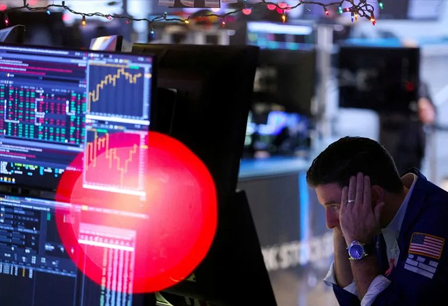The head of the US Federal Reserve has warned that Hamas’s “horrifying” attack on Israel risks derailing the recovery of the global economy.
Jerome Powell said policymakers were “proceeding carefully” as he suggested that recent turmoil in the bond market could limit the need for further rate rises.
Speaking in New York, Mr Powell said it was too early to judge the full impact of the war between Israel and Hamas as countries only begin to count the economic and human cost.
Economists have warned that a sustained conflict in the Middle East could keep inflation high amid rising oil prices and weak growth.
Mr Powell said: “Geopolitical tensions are highly elevated and pose important risks to global economic activity. Our institutional role at the Federal Reserve is to monitor these developments for their economic implications, which remain highly uncertain.
“Speaking for myself, I found the attack on Israel horrifying, as is the prospect for more loss of innocent lives.”
Fears about the deteriorating situation in the Middle East and higher for longer interest rates weighed on financial markets on Thursday.
The FTSE 100 closed down 1.17pc, while Hong Kong’s Hang Seng index fell by almost 2.5pc.
US 10-year bond yields hit a fresh 16-year high, edging closer to the psychologically important level of 5pc as the country’s long-term borrowing costs also continued to rise.
Mr Powell described the recent surge in long-term US borrowing costs as “significant” and signalled that higher long-term interest rates could effectively substitute for further Fed rate rises if they are sustained.
His remarks add to a chorus of growing concern about the health of the global economy as countries grapple with higher borrowing costs and ballooning debt.
The head of the International Monetary Fund (IMF) described the Israel-Hamas war as a “new cloud” on the horizon that threatens to darken an already murky global economic outlook.
Kristalina Georgieva said severe shocks were becoming “the new normal” in an economy dominated by weak growth.
The IMF predicted world economic growth would slow from 3.5pc in 2022 to 3pc this year and 2.9pc in 2024 as it downgraded its outlook again.
Mr Powell added on Thursday that previous monetary policy tightening was already “putting downward pressure on economic activity and inflation”, adding that the full economic impact on households and businesses was yet to be felt.
Fed policymakers voted to leave rates unchanged at a range of between 5.25pc and 5.5pc. Officials predict rates will rise once more this year.
Mr Powell said financial markets had “tightened significantly in recent months”, adding: “Longer-term bond yields have been an important driving factor in this tightening. We remain attentive to these developments because persistent changes in financial conditions can have implications for the path of monetary policy.”
However, he did not rule out the possibility of more rate rises amid a resilient jobs market and signalled that borrowing costs were likely to remain higher for longer.
Mr Powell said: “Given the uncertainties and risks, and how far we have come, the committee is proceeding carefully.
“Additional evidence of persistently above-trend growth, or that tightness in the labour market is no longer easing, could put further progress on inflation at risk and could warrant further tightening of monetary policy.”
It came as Mark Carney, the former governor of the Bank of England, predicted that the Fed would be forced to raise interest rates again.
He said: “I expect there will be a bit more tightening by the Fed, so probably an additional rate increase this year.
“It took a while for some of the central banks to fully recognise [inflation] and to start to respond. Once they started to move and particularly when the Fed started to move, it did respond in a very effective manner. It consistently surprised people with how resolute it was, what it was prepared to do.”
He added that the risk of recession is falling despite the rate rises. “The Fed has done quite a masterful job,” Mr Carney said.












